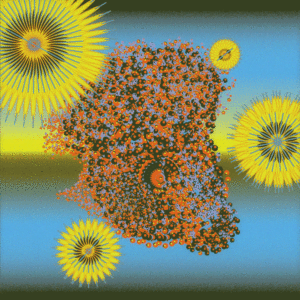The majestic cell
How the smallest units of life determine our health
This issue of Stanford Medicine magazine delves into research on cells, providing insights into basic biology, human health and the power of curiosity.

Exploring cells
The stuff of life
Discovering the secrets of cells
The company they keep
Neighboring cells influence whether tumors grow or perish
What the cell!
Engineering cells for a new purpose
The worth of ‘worthless’ ideas
A connoisseur of cells explores the wonder and beauty of the world
My favorite cell
Stanford Medicine researchers reveal the cell they most appreciate
COVID’s unwitting enablers?
New research flags unexpected cells in lungs as a suspected source of severe COVID
Graphic: A unit of life
The major structures within an animal cell at rest
Letter from the Dean
‘An unprecedented period of biomedical discovery’
The crucial role of basic science in translational, clinical research and patient care
Plus
Why is a common gene variant bad for your brain?
The answer offers clues for a new kind of Alzheimer’s drug
AI steps into the looking glass with synthetic data
Medical data scientists are using generative AI to create new data from scratch
Hidden in plain sight
Harm from anemia during pregnancy is prevalent, disproportionately affecting Black women
Reconsidered: breast cancer origins and risk factors
Gene sequences from parents have more impact than recognized in determining breast cancer’s course
Anesthesia dreaming
Pleasant dreams during surgery help some people overcome deep trauma
Upfront
Virtual biopsy
Imaging method helps doctors detect disease without tissue samples
Upfront
Upfront is a quick look at the latest development from Stanford Medicine
Get the worm
Night owls more prone to mental health issues than early birds
DNA research disparities
Genetic screening of newborns fails nonwhite families more often
Strength in numbers
New therapy unleashes billions of immune cells on patient’s melanoma
Ask AI
Using artificial intelligence to respond to patient questions is shown to reduce clinician burnout
Celebrating new hearts
Stanford Medicine marks 50 years of heart transplants for its youngest patients
Food therapy
Clinical trial finds that metabolic effects of a high-fat, low-carb diet may improve psychiatric conditions
Dope truths
Education program for adolescents aimed at drug use prevention and safety
Explore Issues

Reimagining cancer
Innovation-driven exploration and care

Psychiatry’s new frontiers
Hope amid crisis

AI explodes
Taking the pulse of artificial intelligence in medicine














